#is this a linguistics post?
Explore tagged Tumblr posts
Text
This is not the most original observation, I've definitely read about it somewhere, but reading Donne's The Flea with the standard early modern long s truly...errr...highlights the intention behind the poem. For the enlightenment of those who are unfamiliar with Donne or struggle with early modern text, line three reads "It suck'd me first, and now sucks thee"

Early modern typefaces can be a problem, particularly when scanned poorly. However, in this one instance, I think we should only ever print the poem with a long s just to preserve this experience.
#john donne#the flea#long s#early modern typefaces#linguistics?#is this a linguistics post?#I'm counting it#early modern poetry#metaphysical poetry#early modern history
5 notes
·
View notes
Text
Words that we should start using more:
- nincompoop
5 notes
·
View notes
Text
Highlights from the conference room where they nominated contenders for Word of the Year 2023:
• They put Skibidi Toilet on the projector to explain what “skibidi” means.
• Baby Gronk was mentioned.
• We discussed the Rizzler.
• “Cunty” was nominated.
• “Enshittification” was suggested for EVERY category.
• “Blue Check” (like from Twitter) was briefly defined as “Someone who will not Shut The Fuck Up”
• The person writing notes briefly defined babygirl as “referencing [The Speaker]”. He is now being called babygirl in the linguist groupchats.
• MULTIPLE people raised their hand to say “I cannot stress this enough: ‘Babygirl’ refers to a GROWN MAN”
92K notes
·
View notes
Text
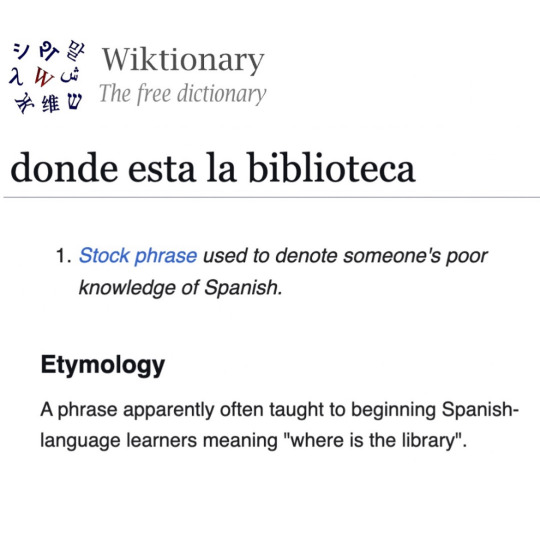
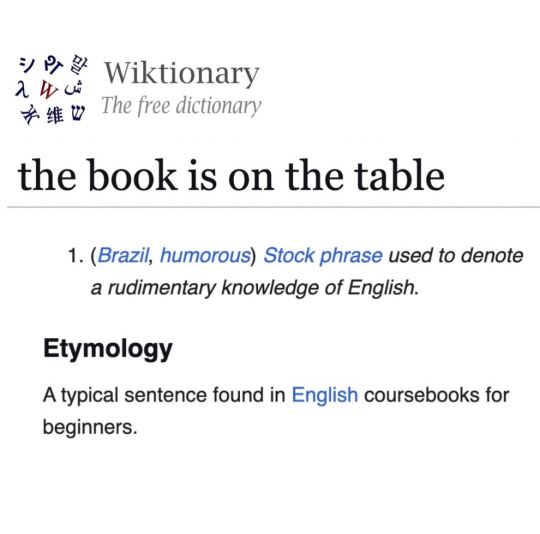
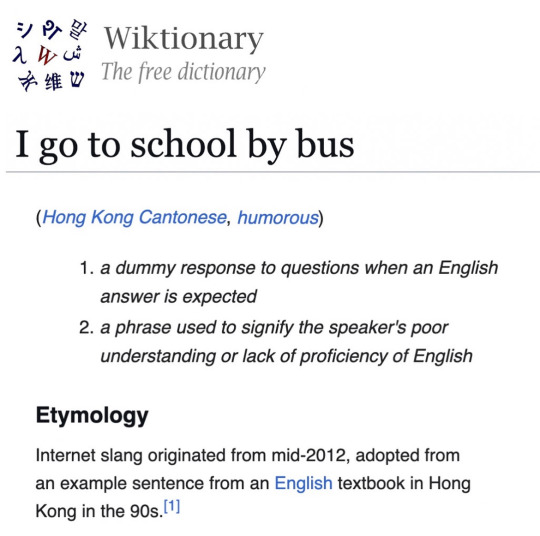
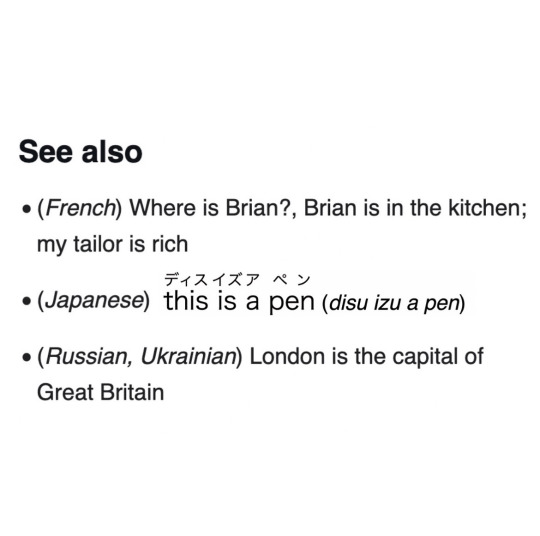
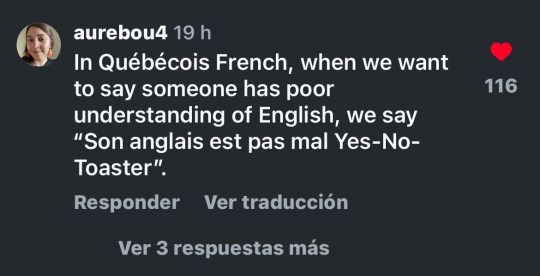
i’m obsessed with these…
(From DepthOfWikipedia on Instagram)
12K notes
·
View notes
Text
fact: when pidgin dialects involve english, -glish becomes the suffix, eg: chinglish, konglish, hinglish fact: slash pair name order puts the top first and the bottom second, eg: deancas vs casdean conclusion: english is an uke language and that’s why we have an omegaverse, not an alphaverse
#fandom#language#linguistics#shitposting#I posted this to bluesky first but it deserves a wider audience because I'm Right goddamit#omegaverse
8K notes
·
View notes
Text
the ladies call me the subjunctive mood the way I express desire, wishes, uncertainty, doubt and fear
6K notes
·
View notes
Text
Theres moreeee, this is so so good.. it makes me emotional realizing that these kids are on the path to being fluent cherokee speakers and will be able to keep the language going.
This family is a part of the little cherokee seeds program, creating new first language Cherokee speakers by paying mothers to just bring their babies and craft and cook and speak cherokee with cherokee elders all day. There are only 1500 first language Cherokee speakers, most of them over 65. They also take donations if you want to help keep them going and doing the extremely important work they do!!

#this was posted half an hour ago. i go on tiktok solely to check out her stuff now#cherokee#ndn#language#linguistics#native american#the first one is blowing up and this one might not but im still putting the info actually in the post this time#the baby going 'ni! ni!' 😭😭😭#[ni means 'look!']
12K notes
·
View notes
Text
AuDHD is so funny sometimes like what do you mean my hyperfixations/special interests will last for years on end or possibly forever but they will cycle out every month or two with absolutely no transitional period or warning. like i will think about the same topic every day obsessively for 46 days in a row and on the 47th day with no visible cause adhd brain goes "ok! bored of that now" and autism brain goes "dw i got something queued up for ya" and i blast into full blown obsession on some other topic whose mental file folders haven't opened in 9 months. brain's out here treating hyperfixations like a crop rotation. once the dopamine runs out it cycles in another one but once something's in the rotation it never ever leaves. last summer we brought in one from when i was 11. it's so funny to me but frustrating too bc like. i cannot stress enough my inability to predict or control this. or how completely abrupt and random it can be
#actually adhd#actually autistic#audhd#aphelion.txt#ik 'adhd brain' vs 'autism brain' is a gross oversimplification especially given how much overlap there can be#but it at least helps me conceptualize wtf is going on in my head when i do this lol#and yeah i'm mostly referring to fandoms in this post but it can happen w more 'Traditional' special interests too#like my linguistics special interest which hasn't popped up in a couple years now but whenever it does#i will fill literal notebooks while studying 4 languages at once and simultaneously inventing a conlang#and then i'll be like Ok that was fun! and several months later im deleting like. 2gb of textbooks off my iphone to make room for an update#And sometimes yeah there is a precipitating event like 'Oh something new happened in X fandom with my blorbo!' but sometimes it's like#yeah. no. idk either. switch got flipped in my brain and X no longer sparks joy. only Y rn. how come it's Y? yeah idk i also wish i knew#i don't think any of this is actually an uncommon experience for people with these types of neurodivergencies it's just.#the severity of abruptness and TOTALITY of the switch that makes me feel like a weirdo sometimes lol#like I'M getting mental whiplash from this sometimes. idk how y'all are still following my blog
7K notes
·
View notes
Text
🪄 lingwizard Follow
Magilinguistics and magiconlinguistics are so underrated. The idea that the specific language and syntax used to cast a spell can alter the efficiency and flow of a spell is amazing; it’s honestly infuriating how many people, including many mages, think Latin is the only valid conjuring language even though glossolalia is a WELL-DOCUMENTED PHENOMENON. I use many other languages in various spells and it’s really fun. Would recommend.
🪶 featherspells Follow
YOU CAN DO THAT? YOU CAN TRANSLATE LATIN SPELLS INTO A DIFFERENT LANGUAGE AND THEY’LL WORK!?! EVEN YOUR NATIVE LANGUAGE?!
🌱 gandalfbignaturals Follow
Yeah, welcome to the club! Using your native language isn’t recommended for summoning forces from other realms, though. The portals tend to collapse if you do that.
🗝️ keytomychest Follow
Wait wait wait, I just consulted my familiar about this, is magiconlinguistics modifying or inventing an entire language to optimize your magic? Because that sounds like something both extremely commendable and also batshit insane.
🌳 druid-ruin Follow
Yeah, that’s basically exactly what it is. We’re surprisingly pretty chill. I mean, except for that one time where someone hyper-optimized Taikureiden Suomen Kieli V5 to create the first, and most dangerous, known instance of the Everything-Damage Fireball spell, but we usually don’t talk about that.
🪄 lingwizard Follow
Ah, Taikureiden Suomen Kieli, the most absolutely broken magilang to ever exist. Go Finland, give us more fucked-up spells!
🪶 featherspells Follow
wait, the Everything-Damage Fireball is REAL? I thought you guys were joking.
🌳 druid-ruin Follow
We WERE joking. ONCE.
🔥 icastfireball Follow
on one hand, this is really cool and all, but on the other hand, i'm scared of what this can do. However, on the secret third hand, i kinda wanna modify a language to make demonic creatures physically sick upon hearing it, cause i wanna do a little trolling.
🪄 lingwizard Follow
Grand Mage Amara Lightningchain coming up with the idea for the Volapük Silananazunik experiments be like:
🔥 icastfireball Follow
hold on let me look something up
🔥 icastfireball Follow
wh. what the fuck
#linguistics#wizardposting#fake posts#fake post#dashboard simulator#first time making one of these so go easy on me
9K notes
·
View notes
Text
Did you know that the english word “star” and the japanese word 星(ほし)don’t actually mean the same thing?
Language does not simply name pre-existing categories; categories do not exist in 'the world'
— Daniel Chandler, Semiotics for Beginners
I read this quote a few years ago, but I don’t think I truly understood it until one day, when I was looking at the wikipedia article for “star” and I thought to check the Japanese article, see if I could get some Japanese reading practice in. I was surprised to find that the article was not titled 「星」, but 「恒星」, a word I’d never seen before. I’d always learnt that 星 was the direct translation for “star” (I knew the japanese also contained meanings the english didn’t, like “dot” or “bullseye”, but I thought these were just auxiliary definitions in addition to the direct translation of “star” as in "a celestial body made of hydrogen and helium plasma").
To try and clear things up for myself, I searched japanese wikipedia for 星. It was a disambiguation page, with the main links pointing to the articles for 天体 (astronomical object) and スター(記号)(star symbol). There was no article just called 「星」.
It’s an easy difference to miss, because in everyday conversation, 星 and star are equivalent. They both describe the shining lights in the night sky. They both describe this symbol: ★. They even both describe those enormous celestial objects made of plasma.

But they are different - different enough to not share a wikipedia article. 星 is used to describe any kind of celestial body, especially if it appears shiny and bright in the night sky. “Star” can be used this way too (like Venus being called the “morning star”), but it’s generally considered inaccurate to use the word like this, whereas there is no such inaccuracy with 星. You can say “oh that’s not actually a star, it’s a planet”, but you CAN’T say 「実はそれは星ではなく惑星だよ」 (TL: that’s not actually a hoshi, it’s a planet). A planet IS a 星.
星 is a very common word, essentially equivalent to “star”, but its meaning is closer to “celestial body”. I haven’t looked into the etymology/history but it’s almost like both english and japanese started out with a simple, common word for the lights in the sky - star/星 , but as we found out more about what these lights actually were, english doubled down on using the common word for the specific scientific concept, while japanese kept the common word generic and instead came up with a new word for the more specific concept. If this is actually what happened, I’d guess that kanji probably had something to do with it - 星 as a component kanji exists inside the word for planet, 惑星, and in the word for comet, 彗星, and in the scientific word for “star”, 恒星, so it makes sense that it would indicate a more general concept when used standalone.
This discovery helped me understand that quote - categories don’t exist in the world, we are the ones who create them. I thought that the concept of “star” was something that would be consistent across all languages, but it’s not, because the concept of “star” is not pre-existing. Each language had to decide how to name each of those similar star-like concepts (the ★ symbol, hot balls of gas, twinkling lights in the sky, planets, comets, etc), and obviously not every language is going to group those concepts under the same words with the same nuance.
Knowing this, one might be tempted to say that 恒星(こうせい) is the direct translation for “star”. But this isn’t true either. In most of the contexts that the word “star” is used in english, the equivalent japanese will be simply 星. Despite the meanings not lining up exactly, 星 will still be the best translation for “star” most of the time. This is the art of translation - knowing when the particulars are less important than the vibe or feel of a word. For any word, there will never be an exact perfect translation with all the same nuances and meanings. Translation is about finding the best solution to an unsolvable problem. That's why I love it.
#translation#japanese#japanese language#learning japanese#language#langblr#language learning#semiotics#linguistics#japanese vocab#jimmy blogthong#official blog post
5K notes
·
View notes
Text
ֆօʍɛ ֆɨʍʟɨֆɦ քɦʀǟֆɛֆ ʏօʊ ʍɨɢɦȶ ʄɨռɖ ʊֆɛʄʊʟ ɨռ ʟɨʄɛ
hello : sul sul! / what's up : bloo bagoo? / how are you : cuh teekaloo? / i'm hungry : oh feebee lay / something in my way : choo waga choo choo! / you've got some nerve : firby nurbs / yes : yeibs / no : neib / oh my god : jamoo / woah this is fun : bum bum! / anyone home : nash na poof? / are you serious right now : ugh...groble! / you! yes you! go away : depwa spanewash depla blah! / excuse-me! get out of the way : blursh! meshaloob blursh! / i don't like you : boobasnot / no bullying : yabihorn! / i'm so bored : uhh shamoo ralla poo / happy birthday : humple borpnah! / this food is delicious : dis wompf es fredesche / thank you : vadish / nothing is impossible if you believe : benzi chibna looble bazebni gweb / cat : minicule / dog : woofum / baby is upset : aw crankus nooboo! / i'm pregnant : baba / i think you're hot : za woka genava / selfie : ongie! / i need a taxi : nicloske ga gloop / see you soon : geelfrob / i love you : por see gab lurv / live laugh love : leeb leefuh lurve / i'm on fire : wabadeebadoo! / goodbye : dag dag
#the sims#the sims 4#the sims 3#the sims 2#ts4#ts3#ts2#sims 4#sims 3#sims 2#sims#simblr#thesims#thesims4#sims4#sims community#the sims community#text post#funny#funny stuff#meme#funny memes#humor#linguistics#language#conlang#sims 4 gameplay#ts4 gameplay#life hacks#video games
3K notes
·
View notes
Text


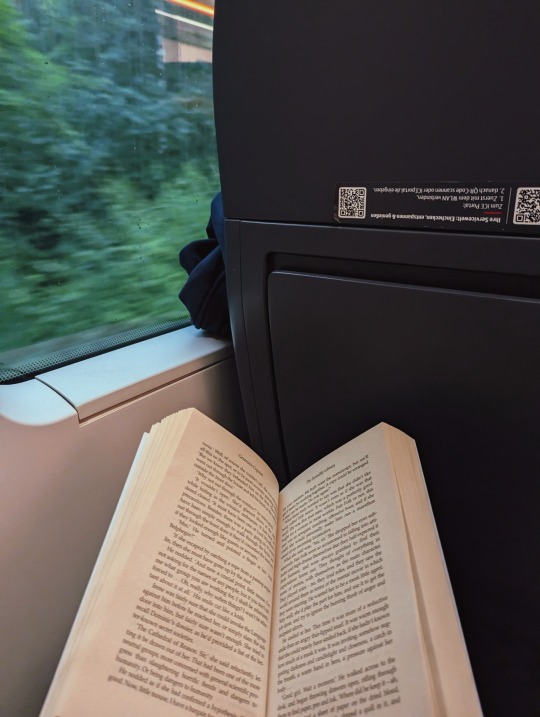

23.08.24 i am currently enjoying my exam/term paper-free life by working too much, cleaning to de-stress and finally getting back into reading (bought piranesi by susanna clarke yesterday, very excited). my first master's semester is slowly approaching and the courses all look promising. also, looking forward to autumn!
🎧 - the wolf by siamés
#it's hard to make study posts when i'm not studying#studyblr#langblr#aesthetic#study aesthetic#study inspiration#studying linguistics#studying english literature#studyspo#academia#jaystudies
1K notes
·
View notes
Text
a24 should just say “hey amazingphil. make a movie about anything. go wild.” and i think we would get an absolute masterpiece
#i need him to make a philm#like that man has one of the most fun and creative minds ever and a english language linguistics or whatever degree#can u imagine the kind of script he would write. like pls#mabel post#dan and phil#phan#dnp#phandom#phil lester
1K notes
·
View notes
Text
TL;DR: We're looking for English-speaking neopronoun users (aged 18+) to participate in a paid linguistics study.
Hello!
Professor Kirby Conrod from Swarthmore College is recruiting participants for a paid interview study (in-person in Philly or on zoom). Anyone who uses neopronouns for themself, is 18 or older, and is fluent in English is welcome to participate. The study will consist of a casual interview between you and a researcher, a similar interview with a friend of yours, and an exit survey for each of you. Each will receive $15 as compensation for their time.
If you're interested in participating, please fill out this form: (https://forms.gle/YajpkjxGYiwL7RLF6). Filling out this form does not require you to participate; it's just an expression of interest.
Even on Tumblr, neopronoun use is relatively uncommon, so it would be very helpful if folks could reblog this post to help it reach as many neopronoun users as possible.
4K notes
·
View notes
Text
"You don't see characters in classic literature telling people their pronouns" I mean, if we're gonna get technical, Captain Nemo only has pronouns.
#media#literature#tropes#twenty thousand leagues under the sea#captain nemo#gender#pronouns#technicalities#language#linguistics#word nerdery#this is a serious post
3K notes
·
View notes
Text
translating things into toki pona is so serotonin-inducing because you have to ask yourself "how the hell do i translate snake" and your brain just goes "it's a string lizard. obviously"
923 notes
·
View notes